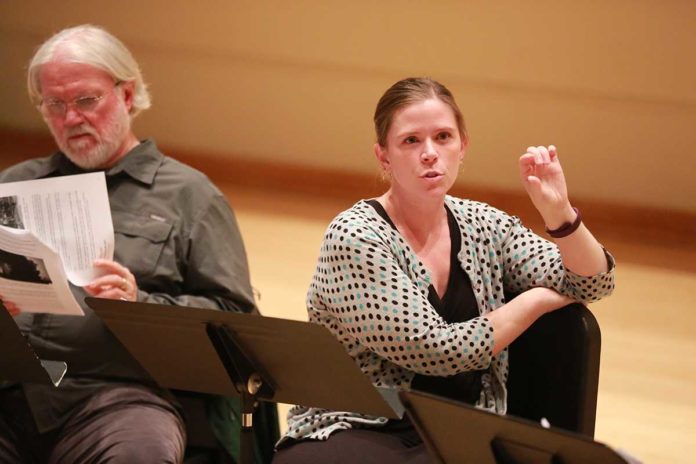Members of the SRU faculty hosted a roundtable discussion in Swope Auditorium Thursday night, which allowed students to ask questions about what worries them in the upcoming election.
Dr. George Brown, Dr. David Kershaw, Dr. Heather Rice and Dr. Sharon Sykora, of the Political Science Department, led the roundtable discussion along with Dr. Cindy LaCom of the Gender Studies Program.
The faculty developed their own set of questions for the discussion that they felt students would want answered, and let students ask their own questions to the group. The questions revolved around not only the presidential candidates but their views on current issues, the third party candidates, and the views of women and millennial voters.
A big topic among students was Donald Trump’s idea that the election would be rigged to allow Hillary Clinton to win if he does in fact lose. Kershaw assured that the voting process being rigged would be difficult to be accomplished. People tend to know other people when they go to vote, so the use of a fake name or ID would be challenging, Kershaw said. If more and more people try to rig the election. it will catch on and they will get caught, Rice said.
“Trump has claimed of these conspiracies to keep him from being elected ever since he got the nomination,” Rice said. “There are three major ways someone could rig an election in his world. They could stuff the boxes with Clinton votes, use the media bias towards Trump to listen to them and the fact that the whole election is rigged against him. It will be interesting to see how Trump reacts if he does in fact lose.”
Another question arose about whether people should vote solely for the candidate or stick to their party beliefs and vote for the party candidate. There are more undecided voters this year compared to 2008 and 2012, and that can be seen because of the drastic split in parties, LaCom said.
“There is an extreme lack of power within the parties, and it seems like they’re having an identity crisis,” LaCom said. “What each party means and stands for is going to drastically change after this election.”
Gary Johnson has been named as a third-party candidate, but Rice said this shouldn’t be looked at as serious. The electoral system consists of two major parties, and it was designed to be that way, Rice said. The third party candidates can be spoilers, but they will have a tough time winning, Brown said.
Women and millennial voters have been an issue for this election because they make up a vast portion of voters, Brown said. The question remains whether or not the millennial voters will come out on Election Day, LaCom said. LaCom mentioned how Clinton needs to win over these voters since most of them were in favor of Bernie Sanders.
“Recent polls have shown that Clinton is winning over the millennial and women voters, but Trump could still sway their opinion,” LaCom said. “Clinton is focusing more on education, which appeals to the millennials because it is their future.”
Each candidate has been involved in some sort of scandal or another, and this has been more of a focus than the pressing issues at hand, Rice said. It’s been more about the e-mails and the comments about women than what matters to the American people, LaCom said.
Another major question was how some of the candidate’s views and ideas would be moved into action if elected. Brown discussed said that little changes would occur if Hillary were elected, but that things may change if Trump is.
“If Trump is elected it will be interesting to see if he changes his views or tones it down a bit once in office,” Brown said. “Each candidate is critical of one another’s opposing views and proposed ideas, and some are more realistic than others. Trump’s proposed wall plan to build in Mexico is unrealistic in my opinion.”
At the conclusion of the discussion, Sykora asked each panel member for their opinion on who they thought would win. Each member gave a response, with the majority saying Clinton would win, but it would be a close election.
The common theme of each professor was to make sure that students are informed about the candidates before they vote. Students need to vote, but should go informed and well-read on each candidate, Sykora said.
“This is a very important election, and everyone should go out and vote come Tuesday,” Sykora said.








